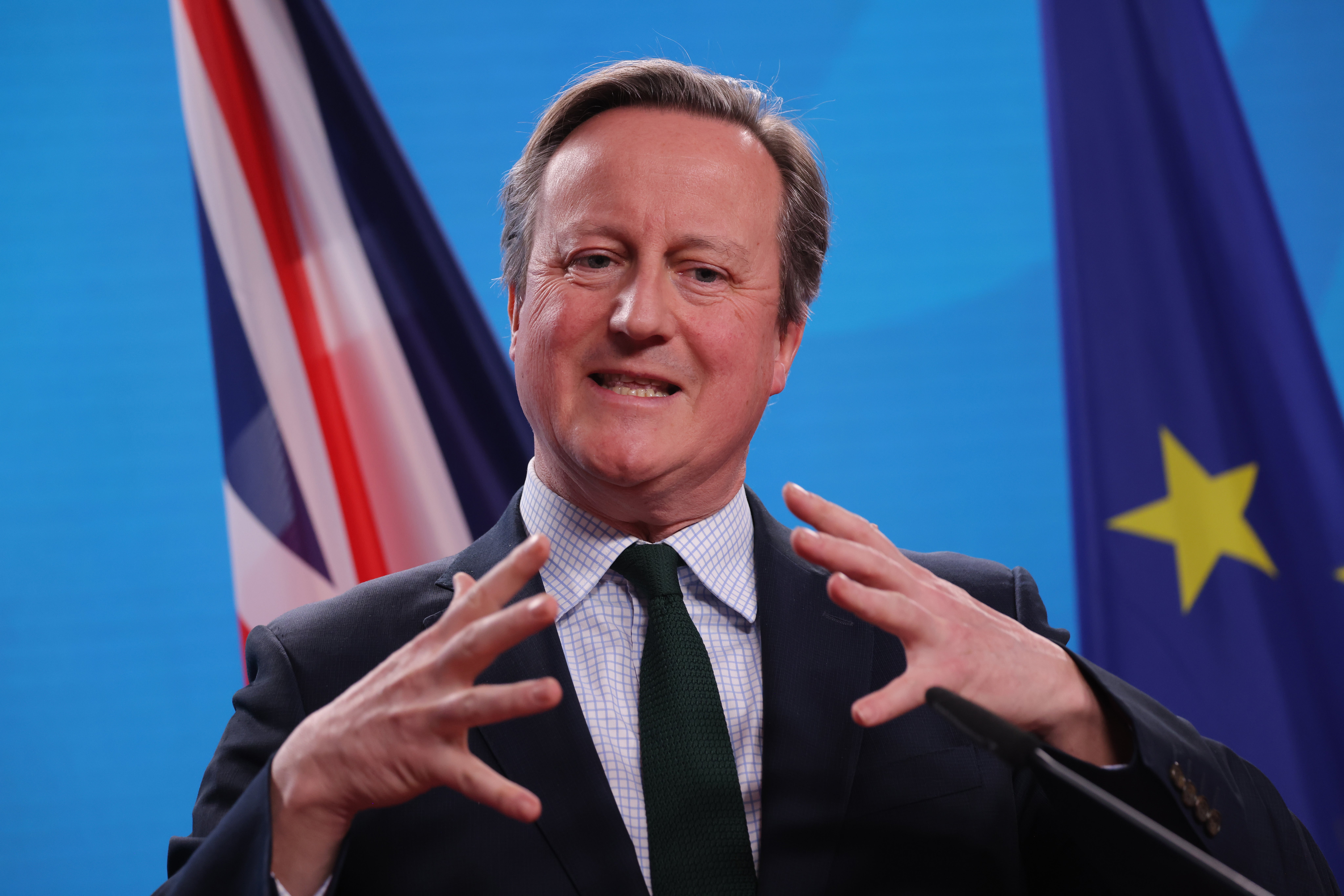David Cameron says sending foreign troops to Ukraine would provide ‘targets’ for Russia
Foreign secretary warns: ‘We should not create obvious targets for Mr Putin’

David Cameron has said he is opposed to sending Western troops to Ukraine even for training missions, warning that the UK “should not create obvious targets” for Vladimir Putin.
During an interview with German daily newspaper Suddeutsche Zeitung, the foreign secretary was asked whether it was wise to rule out sending Western soldiers to Ukraine.
He said training missions were best carried out abroad, and added that 60,000 Ukrainian soldiers have been trained in the UK.
Lord Cameron also outlined his vision for a post-war Europe, telling the paper: “A success for Putin would be very bad and destabilising for Europe.
“I see two scenarios for our future. In one, Ukraine succeeds in pushing back Russia and achieving a just peace. In this scenario it would become clear that aggression is not worth it and that Putin has to pay a price for it. Then we look forward to a brilliant future with a stronger Nato, a united transatlantic community and growth and prosperity.
“[The other] would mean great uncertainty, not only for Europe but also for the world. If one bully gets away with unwarranted aggression, other bullies will follow.”
Lord Cameron also said Ukraine needed more long-range weapons and that he was willing to work with Berlin to solve its hesitance in supplying Taurus cruise missiles.
Chancellor Olaf Scholz has stalled for months on Ukraine’s desire for the German-made missiles, which have a range of up to 500 kilometres (310 miles) and could, in theory, be used against targets deep into Russian territory.
Lord Cameron’s comments come as Ukrainian foreign minister Dmytro Kuleba hit out at Pope Francis, who reportedly said Ukraine should have the “courage of the white flag” and be ready for negotiations with Russia.
“The strongest is the one who, in the battle between good and evil, stands on the side of good rather than attempting to put them on the same footing and call it ‘negotiations’,” Mr Kuleba said in a post on X, formerly Twitter.
“At the same time, when it comes to the white flag, we know this Vatican’s strategy from the first half of the 20th century. I urge to avoid repeating the mistakes of the past and to support Ukraine and its people in their just struggle for their lives.
“Our flag is a yellow and blue one. This is the flag by which we live, die, and prevail. We shall never raise any other flags.
“We thank his holiness Pope Francis for his constant prayers for peace, and we continue to hope that after two years of devastating war in the heart of Europe, the pontiff will find an opportunity to pay an apostolic visit to Ukraine to support over a million Ukrainian Catholics, over five million Greek Catholics, all Christians, and all Ukrainians.
Pope Francis, in an interview with Swiss broadcaster RSI, called for negotiations in Russia’s war against Ukraine. He reportedly said: “The strongest one is the one who looks at the situation, thinks about the people and has the courage of the white flag, and negotiates.”
Responding through a post on X, Polish foreign minister Radek Sikorski said: “How about, for balance, encouraging Putin to have the courage to withdraw his army from Ukraine? Peace would immediately ensue without the need for negotiations.”
The Vatican later clarified that the Pope supported “a stop to hostilities [and] a truce achieved with the courage of negotiations”, rather than an outright Ukrainian surrender.
Matteo Bruni said that the journalist interviewing the Pope used the term “white flag” in the question that prompted the controversial remarks.
Subscribe to Independent Premium to bookmark this article
Want to bookmark your favourite articles and stories to read or reference later? Start your Independent Premium subscription today.

Join our commenting forum
Join thought-provoking conversations, follow other Independent readers and see their replies